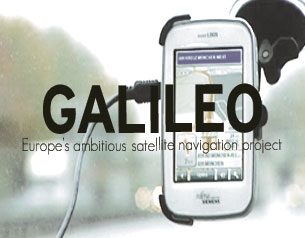Galileo
Filled with intrigue, controversy and no little ambition this is the story of Europe's project to rival the American GPS system.
 Galileo is Europe's ambitious satellite navigation project, designed to rival the American GPS, and invigorate European transport and communications infrastructure. It started as an exciting, forward-looking scheme but before long descended into farce - the product of clever American diplomatic manoeuvring and destructive inter-European wrangling. From conspiracy theories to question marks over the future of the EU as a viable body, Galileo is a yarn worthy of its controversial namesake.
Galileo is Europe's ambitious satellite navigation project, designed to rival the American GPS, and invigorate European transport and communications infrastructure. It started as an exciting, forward-looking scheme but before long descended into farce - the product of clever American diplomatic manoeuvring and destructive inter-European wrangling. From conspiracy theories to question marks over the future of the EU as a viable body, Galileo is a yarn worthy of its controversial namesake.
The American GPS system has steadily encroached upon daily life, developing from providing basic route-finder information to running complex operating devices for banks, pivotal military operations, as well as day-to-day email and city transport networks.
Given the control which satellite navigation has over modern society, a question mark always lay over the wisdom of allowing America a monopoly on the technology. The thrust of this argument centred around the unthinkable: what would happen if the US military pressed the off switch? As European Commissioner for Transport, Jacques Barrot explains, Europe's satellite navigation system is totally dependent on the US.
But it wasn't only suspicion of the US that prompted the launch of the Galileo project in 1999. Peter Grognard of Septentrio, a Belgian satellite navigation company, explains the technical problems of the GPS system. He sees massive potential for /"modernisation of European infrastructure through satellite navigation systems, as well as a wide range of consumer location services delivered to mobile phone users: from finding lost children, to the nearest ATM. But he believes the limited accuracy of the GPS system, which had never been intended for civil use, has hampered growth.
In contrast to GPS, Galileo would be run by a public-private partnership; its priority would not be military. Crucially it would guarantee pinpoint accuracy in a way that the security-conscious US military had never allowed. Mattius Ruette, part of the EU transport staff tells us, "We were very optimistic. We were actually saying in 1999 that we could have Galileo up and running in 2008." But then the problems hit, principally in the face of mounting US opposition.
In a bid to exploit European divisions, and protect their monopoly, the US announced the launch of GPS3. It would be more accurate, and importantly, would not have an off switch. They also raised security concerns: US official Ralph Braibanti was "concerned that Galileo might degrade the deprivation capability" which prevented satellite navigation aiding "adversaries".
With America's manoeuvring, European solidarity collapsed. Karel Van Miert, "as usual the US put pressure on a number of governments who then put the brakes on." One of those governments was that of the British. Stephen Ladyman was Minister of Transport at the time, with US promises to guarantee Europe's GPS service, he began to see Galileo as an expensive "vanity project". But then, mysteriously, in November 2007, the EU member states came to an agreement. What had changed? Taylor Dinerman, a space journalist, points out that combined with France's nuclear weaponry, Galileo would provide Europe with military reach to rival the US. Was it this realisation that consolidated European governments? Did the November agreement spell the end of Galileo as a civil project? So far, the Galileo project remains on track for completion in 2013; but Jacques Barrot warns that the controversies are not over. "This could herald the end of Europe," he admits.
FULL SYNOPSIS
With America's manoeuvring, European solidarity collapsed. Karel Van Miert, "as usual the US put pressure on a number of governments who then put the brakes on." One of those governments was that of the British. Stephen Ladyman was Minister of Transport at the time, with US promises to guarantee Europe's GPS service, he began to see Galileo as an expensive "vanity project". But then, mysteriously, in November 2007, the EU member states came to an agreement. What had changed? Taylor Dinerman, a space journalist, points out that combined with France's nuclear weaponry, Galileo would provide Europe with military reach to rival the US. Was it this realisation that consolidated European governments? Did the November agreement spell the end of Galileo as a civil project? So far, the Galileo project remains on track for completion in 2013; but Jacques Barrot warns that the controversies are not over. "This could herald the end of Europe," he admits.
